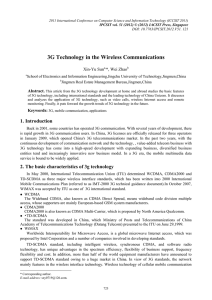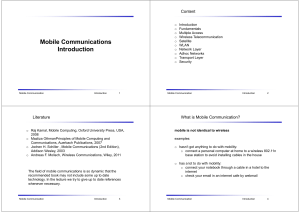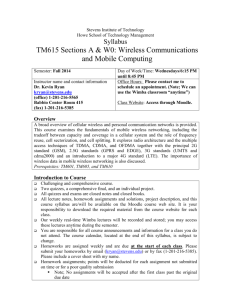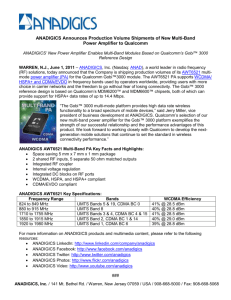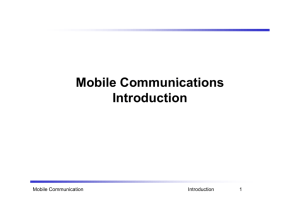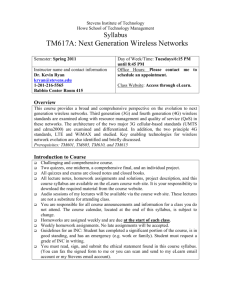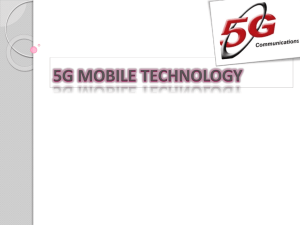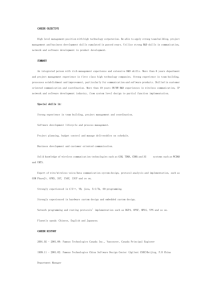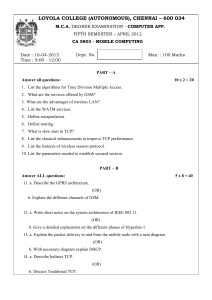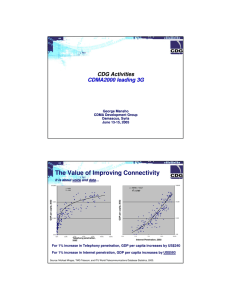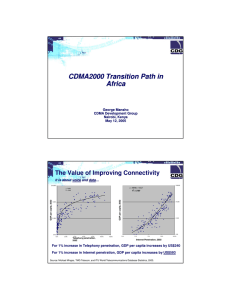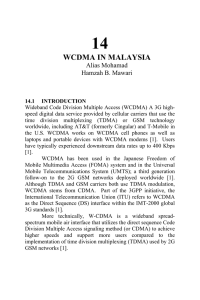3G Wireless
advertisement
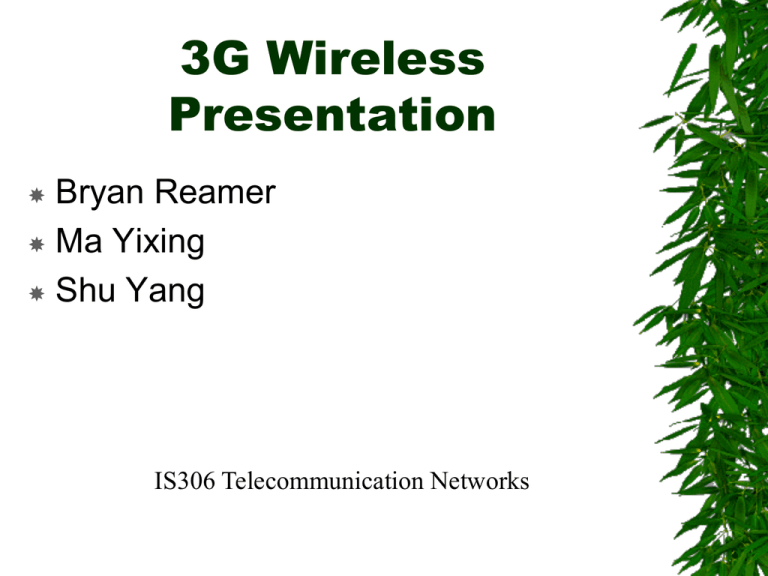
3G Wireless Presentation Bryan Reamer Ma Yixing Shu Yang IS306 Telecommunication Networks 3G wireless The next step in mobile communications – Define 3G wireless – Where implementation is at – Constraints to Global implementation – Who benefits – What are the benefits 3G’s ITU IMT-2000 definition Support circuit and packet data high bit rate – 144kbps in high mobility(vehicular) traffic – 384kbps for pedestrian traffic – 2Mbps or higher for indoor traffic Interoperability and roaming common billing/ user profile – Sharing of usage/rate information between service provider – Standardized call detail recording – Standardized user profile Geographical position of mobiles and report it to both the network and the mobile terminal Support of multimedia services/ capabilities – – – – Fixed and variable bit rate traffic Bandwidth on demand Asymmetric data rates in forward and reverse links Multimedia store and forward – Broadband access up to 2Mbps Current Products FOMA N2001 by NEC, the standard phone, with an improved color screen and -like the P2101V- no external antenna. P2101V by Panasonic, outwardly similar to the P503is, sports a camera that besides taking stills allows it function as a TV phone with other P2101V handsets. P2401 by Panasonic, a PCMCI card designed for data transmission up to 384Kpbs downstream and 64K upstream. Wireless Services Available in US Verizon - cdma2000 1x technology up to 144 kbit/s but users should see speeds of 40 to 60 kbit/s on average. data speed 19.2kbps or less locally Sprint - Plans to upgrade by 2004 GPSR and EDGE Cingular - plans to start CDMA2000 1x AT&T - Deploying GSM/GPRS to 40% of its market, next to EDGE software to WCDMA T-Mobile - GSM/GPSR service Nextel Communications – unknown plans 3G wireless timeline September 1998: Call in DoCoMo's trial network October 1, 2001: NTT DoCoMo launched commercial WCDMA 3G mobile network. November 1, 2001: Live 3G EDGE call. December 1, 2001: Commercial UMTS network(Norway). No UMTS terminals December 19, 2001: International UMTS 3GPP roaming calls. Madrid - Tokyo. January 28, 2002: Commercial CDMA2000 1xEV-DO. February 8, 2002: End-to-end 3G WCDMA 3GPP packet data calls February 18, 2002: GSM/GPRS and 3G/UMTS product. February 20, 2002: Rich call in an end-to-end All-IP September 24, 2002: Dual mode WCDMA/GSM calls with seamless handover between the two modes and high data rate in live networks September 25, 2002: "Europe's First UMTS-Network" September 26, 2002: Nokia [6650] for WCDMA [UMTS] and GSM networks". October 1, 2002: Bluetooth WCDMA (UMTS) and GSM Voice Calls. October 3, 2002: VoIP call completed in a 3GPP release 4 compliant network. October 10, 2002: UMTS voice and data calls demonstrating mobility across commercial cell sites using live 1900 MHz radio spectrum, Reasons for delay Regulations Developing Technology Financial Considerations 3G Technology: -UMTS (W-CDMA,TD-CDMA) & CDMA 2000 UMTS- Europe, Japan, China CDMA2000 – US, Korea 3G Technology: -UMTS – W-CDMA (FDD) Duplex – TD-CDMA (TDD) 3G Technology: -CDMA 2000 – 1XRTT (144 Kbps) – 3XRTT (2Mbps) – 1X EV (Evolution) 1X EV-DO ("Data Only"): Separate frequencies for data and voice. 1X EV-DV ("Data and Voice"): integrate voice and data on the same frequency band W-CDMA vs. CDMA 2000 – W-CDMA: Brand new network, requires new spectrum. – CDMA2000: Build on the old CDMA network, deploy fast, flexible in spectrum, more efficient for both voice and data, base station synchronization, existing in Korea. Standardization: 3GPP- UMTS 3GPP2- CDMA2000 Global Roaming Spectrum: ITU Suggests 1885-2025 MHz and 2110-2200 MHz for 3G service. Europe and Asia: Available US: N/A Spectrum: Regulators FCC (Federal Communication Commission) NTIA (National Communications and Information Administration) US, until September-2004 Demand is high, spectrums are limited Carriers need the license from government to run the business. Is 3G a wireless marvel or an investment disaster? The 3G technology promises highspeed data, mobile streaming video and anytime-anywhere access. But implementation costs have significantly dampened enthusiasm. Spectrum cost Limited spectrum Major carriers have to pay the $16 billion for getting the license from government auction of spectrum licenses. the prices some companies paid for licensing are affecting their ability to invest in 3G infrastructure. Technology cost WCDMA or CDMA 2000 Example of Korea and Japan The situation is similar in the U.S. Sprint PCS and other CDMA operators on the path to cheaper upgrade than those operators on the path to WCDMA. So the CDMA2000 has time advantage, W-CDMA has scale. but this scale advantage need time. Price compare The existing networks are determining what path the carriers are choosing to get to 3G. · North American wireless carriers Carrier Path to 3G Wireless subscribers (voice & data) Sprint PCS CDMA 2000 90 million Verizon Wireless CDMA 2000 26 million Cingular WCDMA 19 million AT&T Wireless UMTS & WCDMA 12 million VoiceStream WCDMA 3 million Expensive devices and service to consumers In addition to 3G's already expensive tag, the end user devices to be used in conjunction with the next generation of wireless infrastructure are also expected to be expensive. It's estimated that 3G-enabled handsets will cost $300, in addition to monthly service fees that could be as high as $90. Handsets price Huge market Despite these hurdles, major carries and equipment vendors have mostly laid out their blueprints for migrating toward 3G technology. China already is the world's largest cell phone market, with 180 million subscribers and growing. Current wireless users Conclusion There are several factors that delay the deployment of 3G systems worldwide, but it is such a large market issue companies will continue to use resources in developing 3G technologies. Q&A
